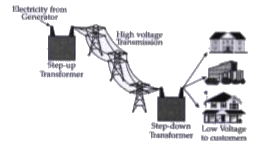Read the following text and answer the following questions on the basis of the same:
At power plant, a transformer increases the voltage of generated power by thousands of volts so that it can be sent of long distances through high-voltage transmission power lines. Transmission lines are bundles of wires that carry electric power from power plants to distant substations.
At substations, transformers lower the voltage of incoming power to make it acceptable for high volume delivery to nearby end-users.
Electricity is sent at extremely high voltage because it limits so-called line losses. Very good conductors of electricity also offer some resistance and this resistance becomes considerable over long distances causing considerable loss.

At generating station, normally voltage is stepped up to around thousands of volts. Power losses increase with the square of current. Therefore, keeping voltage high current becomes low and the loss is minimized.
Another option of minimizing loss is the use of wires of super-conducting material. Super-conducting materials are capable of conducting without resistance, they must be kept extremely cold, nearly absolute zero, and this requirement makes standard super-conducting materials impractical to use. However, recent advances in super-conducting materials have decreased cooling requirement. In Germany recently 1 km super-conducting cable have been installed connecting the generating station and the destination. It has eliminated the line loss and the cable is capable of sending five times more electricity than conventional cable. Using super-conducting cables Germany has also get rid of the need of costly transformers.
Transformers generate waste heat when they are in operation and oil is the coolant of choice. It transfers the heat through convection to the transformer housing, which has cooling fins or radiators similar to heat exchangers on the outside.
Flush point is a very important parameter of transformer oil. Flashpoint of an oil is the temperature at which the oil ignites spontaneously. This must be as high as possible (not less than 160∘C from the point of safety).
Fire point is the temperature at which the oil flashes and continuously burns. This must be very high for the chosen oil (not less than 200∘C).
Why does stepping up voltages reduce power loss?
Since resistance of conductor decreases with increase of voltage
Since current decreases with increase of voltage
Both of the above
None of the above
The correct Answer is:B
At generating station, normally voltage is stepped up to around thousands of volts. Power losses increase with the square of current. Therefore, keeping voltage high, current becomes low and the loss is minimized.
Similar Questions
For reduce in Ohmic loss transmission of electric power at very far distance of electric power is done at very high voltage ?
02:46View Solution(A): Electrical power through transmission lines is transmitted at high voltage. (R): At high voltage theft of power is checked
View SolutionRead the following passage and then answer questions on the basis of your understanding of the passage and the related studied concepts. A small township with a demand of 880 kW of electric power at 220 V is situated 20 km away from a mini hydropower generating station generating power at 440 V. The resistance of the two wire line carrying power is 0.5 ohm per km. The town gets power from the line through a 11 kV-220 V step down transformer at a substation at the township. If the electric substation of township starts supplying power to the township, using a 33 kV - 220 V step down transformer then estimated value of line power loss in the form of heat will change to
View SolutionIn the transmission of a.c. power through transmission lines, when the voltage is stepped up n times, the power loss in transmission ……….
02:40View SolutionThe electricity generated at the power stations is transmitted to distant places in high voltage. What is the voltage at which electricity is generated in the power station?
02:31View SolutionThe electricity generated at the power stations is transmitted to distant places in high voltage. What are the problems facing in Iong distant power transmission?
01:26View SolutionPower stations are centres that generate and distribute large quantities of electricity. Power submission is the process of sending electricity to distant places through wires from the power stations In which stage of power transmission is the step up transformer used ?
05:17View SolutionA: Electrical power through transmission lines is transmitted at high voltage.
R: At high voltage theft of power is checked.04:23View Solution

